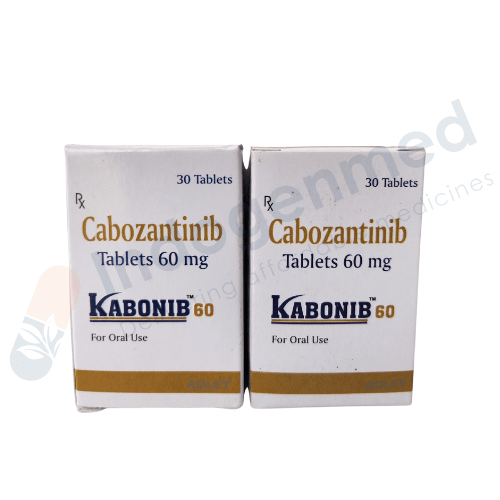



| Packaging Type | Bottle |
| Generic Name | Cabozantinib 60mg |
| Manufactured By | |
| Quantity | 30 Tablets |
| Form | Tablet |
| Country of Origin | India |
| Categories | Oncology |
Description
Introduction to Kabonib 60mg Tablet
Kabonib Cabozantinib 60mg is a high-quality generic version of Cabometyx, a well-established treatment for various types of cancer. Kabonib offers the same therapeutic benefits as Cabometyx but at a more accessible price, making it an excellent choice for patients seeking effective cancer treatment.
Kabonib Tablets are a targeted cancer treatment for advanced renal cell carcinoma and hepatocellular carcinoma. It contains Cabozantinib, which stops tumor growth by blocking several pathways. This action helps slow the progression of cancer and can lead to improved patient outcomes.
Both Kabonib and Cabometyx contain Cabozantinib and treat similar cancers, but Kabonib is less expensive. This cost difference makes Kabonib appealing to patients who need long-term treatment without the high costs of brand-name drugs.
Cabozantinib mechanism of action
Kabonib Cabozantinib 60mg is a potent medication for treating cancers like advanced kidney, liver, and thyroid cancer. It works by blocking specific proteins and pathways that cancer cells need to grow and survive. Kabonib is a tyrosine kinase inhibitor, which means it stops enzymes that help cancer cells grow by sending signals within the cell. By blocking these enzymes, Kabonib disrupts the signals that cancer cells need to multiply, slowing or stopping their growth.
Kabonib also targets the vascular endothelial growth factor receptor (VEGFR), which is important for the formation of new blood vessels that supply tumors with nutrients and oxygen. By blocking the formation of new blood vessels, Kabonib reduces blood flow to the tumor, starving it of the nutrients it needs to grow. Additionally, Kabonib inhibits other key receptors, such as MET and AXL, which help cancer cells survive, spread, and resist treatment. By blocking these receptors, Kabonib tackles different ways cancer cells avoid therapies, making it more effective.
Kabonib's ability to block growth signals, prevent blood vessel formation, and inhibit cancer-related pathways helps slow disease progression and improve patient outcomes. This makes Kabonib an essential tool in cancer management.
FDA Approval
On September 17, 2021, the U.S. Food and Drug Administration (FDA) approved cabozantinib for the treatment of advanced renal cell carcinoma (RCC). Clinical trials showed that cabozantinib significantly improves overall survival and progression-free survival in patients with advanced kidney cancer. Additionally, it has demonstrated better survival outcomes in patients with hepatocellular carcinoma (HCC) who were previously treated with sorafenib, further expanding its use in cancer treatment.
The approval and clinical data for Cabometyx also apply to Kabonib, as it contains the same active ingredient and meets the same high standards. Kabonib offers a more affordable option while delivering the same clinical benefits as Cabometyx.
Uses of Using Kabonib
- Kabonib targets explicitly cancer cell growth by inhibiting tyrosine kinase activity, helping to stop or slow tumor development.
- It blocks the formation of new blood vessels (angiogenesis) that supply nutrients to tumors, effectively starving the cancer cells.
- Kabonib is approved for the treatment of advanced kidney cancer, liver cancer, and thyroid cancer.
- By inhibiting receptors such as MET and AXL, Kabonib reduces the risk of cancer cells spreading to other parts of the body.
- Kabonib can target mechanisms that cancer cells use to develop resistance to other treatments, making it effective even in complex cases.
Dosage and Administration
Standard Dosage for Kabonib 60 mg Tablets
- Take one Kabonib 60 mg Tablet once daily, ideally at the same time each day.
- Dose may be reduced to 40 mg or 20 mg daily if severe side effects occur.
- Patients with moderate liver issues may need a lower starting dose.
Instructions for Proper Administration
- Take on an empty stomach (1 hour before or 2 hours after eating).
- Swallow whole with water; do not crush or chew.
- Avoid grapefruit or grapefruit juice while on Kabonib.
Missed Dose or Overdose
- If a dose is missed, take it as soon as possible unless it's close to the next dose—then skip it.
- Do not double up on doses.
- In case of overdose, seek immediate medical help.
Cabozantinib Side Effects
Common and Serious Side Effects of Cabozantinib
Common Side Effects:
- Fatigue
- Diarrhea
- Nausea and Vomiting
- Decreased Appetite
- Mouth Sores
- Weight Loss
Serious Side Effects:
- Hypertension
- Hand-Foot Syndrome
- Liver Toxicity
- Severe Bleeding
- Gastrointestinal Perforation
- Thromboembolic Events
Precautions while taking Kabonib 60mg
Hypertension: Check your blood pressure often and change treatment if needed.
Liver Function: Get regular liver tests to check for possible liver damage.
Pregnancy and Breastfeeding: Kabonib can harm an unborn baby, so do not use it during pregnancy. It is also not safe to breastfeed while on this treatment.